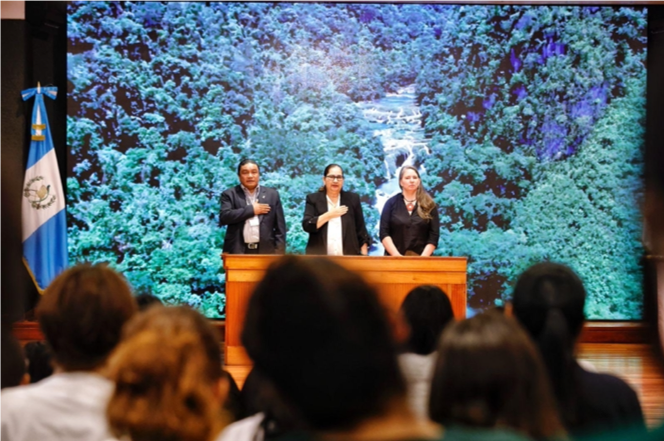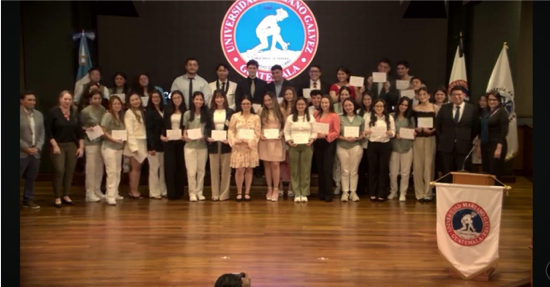2024-10-24
ReAct Latin America organized a meeting on 16 October that brought together experts from Argentina, Ecuador, El Salvador and Guatemala on the occasion of World Food Day, to engage the medical, veterinary, agricultural, community, nursing and education sectors in dialogue about bacterial resistance to antibiotics under the One Health approach.

The meeting recognized that the current socio-ecological crisis facing the world requires coordinated and intersectoral actions that raise awareness among decision-makers about the role of communities and their efforts to address this problem.
Opening of the event

The event was inaugurated by health authorities, Mariano Gálvez University officials and representatives from ReAct Latin America.
“It is increasingly clear that human health, animal health, food safety and the environment are intrinsically connected. This reality also directly affects antimicrobial resistance – AMR – a global threat that requires integrated solutions. This leads us to adopt with greater urgency the “one health” approach, with integration of measures across all sectors”
said Guatemala’s Deputy Minister of Primary Health Care, Dr. Donato Camey
The event was attended by students, professionals and experts from the Ministry of Public Health and Social Assistance (MSPAS), the Mariano Gálvez, Del Valle and San Carlos universities of Guatemala, and professionals in human, animal, agricultural and environmental health.
Presentations highlighting the intersection of AMR, culture and environmental impact
The meeting had various presentations, which addressed topics such as the role of the Mayan worldview in the prevention, detection and response to zoonotic diseases, community empowerment strategies in addressing AMR; social and environmental impact of the inappropriate use of antibiotics in the production of food of animal origin; the soil microbiome and the animal microbiome as well as the relation between antimicrobial resistance and art.
100 medical students

100 medical students from the Mariano Gálvez University, which hosted the meeting, have completed the virtual training course “Alforja Educativa School Health and the Microbial World: to care for planetary health” developed by ReAct Latin America. In 2024, the course was integrated into the “Primary Health Care” chair taught by Dr. Luis Pablo Méndez and Dr. Gilly Morales, from the Mariano Gálvez University. It covered topics such as One Health, Child to Child Methodology, the microbial world, bacterial resistance to antibiotics, and the interrelations with animal health and agriculture. In the context of the event, 35 students received their certificate.
One student says:
“The course was very important for me, as I was able to reflect on aspects that I had not previously considered regarding health and the problems we are going to encounter. In addition, I now believe that I have more tools for working with children and the community,”
More from "2024"
- Empowering patient advocacy and enhancing antimicrobial stewardship
- Tackling disparities in global AMR representation
- Community Champion in Bolivia Sparks Local Action Against Antibiotic Resistance Through Storytelling
- ReAct drives global progress on antibiotic resistance through multi-level engagement in 2024
- Advancing National Priorities for AMR mitigation
- Empowered Communities lead AMR response in Latin America and the Caribbean
- Antibiotic Smart Sweden: certified preschool
- ReAct highlights from World AMR Awareness Week 2024!
- ReAct activities for World AMR Awareness Week 2024
- ReAct attending the 4th Ministerial conference in Jeddah, Saudi Arabia
- Join Empowered Communities webinar 22 November!
- Reflections from the week of the UN High-Level Meeting on AMR in New York
- Zambia moves to strengthen legislative role in addressing AMR
- ReAct at UNGA in New York!
- Forum on Living land, food and antimicrobial resistance launched in Guatemala City
- Engaging medical colleges in tackling AMR
- Art, education and community unite to address antibiotic resistance in Colombia
- 15 year old Merhawi from Sweden knows when to wash his hands
- ReAct’s statement at UN High-Level meeting on AMR
- ReAct partners with ITN Business to improve equitable access to effective antibiotics
- New study: Antibiotic resistance could cause nearly 40 million deaths by 2050
- ReAct statement on the final version of the Political Declaration on AMR
- Opinion: The world’s response to antibiotic resistance is still too weak
- International Meeting “Mother Earth, One Health”: A commitment to life
- Latest version of UN High-Level Meeting Political Declaration disappoints in crucial places
- ReAct Asia Pacific AMR Conference
- Open letter to Ms Amina J Mohammed
- Key takeaways from LMIC roundtable on global governance on antibiotic resistance
- Wold Microbiome Day 2024: Dialogue on alternative to war metaphor in medicine
- ReAct Asia Pacific engages students and teachers in the fight against antibiotic resistance
- The Global Campaign From People to Leaders: Support from 97 communities and civil society groups!
- Growing support for the ‘From People to Leaders’ campaign!
- Community engagement report Asia Pacific
- Reflections from a week where stakeholders took the stage in New York
- ReAct’s Impact Report 2023!
- Cancer, antimicrobial resistance and community engagement
- People’s Health Assembly, Argentina
- ABR and AMR
- ReAct receives additional financial support from Sweden
- AMR must remain an important piece in the Pandemic Agreement puzzle
- Rocky start for the UN High level meeting on AMR
- ReAct Africa and LifeArc launch the ASPIRE initiative for stronger action on antimicrobial resistance
- UN High Level Meeting on AMR: Countdown begins
- ReAct Latin America Dialogue Series
- ReAct expands its work
- New Report Community Engagement
- World Cancer Day: Cancer communities can help making the UN High Level meeting on AMR a turning point
- Handbook for Antibiotic Smart Communities Framework
- Dr. S.S. Lal appointed new Director for ReAct Asia Pacific!
